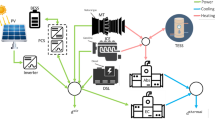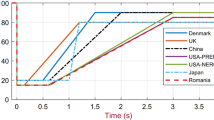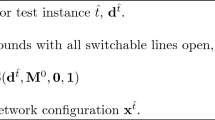Abstract
The paper presents a reinforcement learning approach for optimal tracking control of switched systems with application to a grid-tied hybrid generation system. To enhance interaction with the irregular environment, reference trajectory is learned via controller from states to optimal control. The main issue is to solve the optimal tracking control problem for a hybrid generation system consisting of multiple switched subsystems, and reinforcement learning can seek the globally optimal solution well without knowing accurate system dynamics. The investigated learning algorithm is used to generate an optimum map based on the learned ultimate value without knowledge of system parameters and obtains the optimal control law via deriving of algebraic Riccati equation (ARE) with unnecessary knowing of command generator dynamics. The optimal control solution can converge the online learning algorithm well based on policy iteration as verification in the simulation.





Similar content being viewed by others
References
Kim S, Jeon J, Cho C, Ahn J, Kwon S (2008) Dynamic modeling and control of a grid-connected hybrid generation system with versatile power transfer. IEEE Trans Ind Electron 55(4):1677–1688
Jun Zhao, Dimirovski GM (2004) Quadratic stability of a class of switched nonlinear systems. IEEE Trans Autom Control 49(4):574–578
Aleksandrov AY, Chen Y, Platonov AV, Zhang L (2011) Stability analysis for a class of switched nonlinear systems. Automatica 47(10):2286–2291
Valenciaga F, Puleston PF (2005) Supervisor control for a stand-alone hybrid generation system using wind and photovoltaic energy. IEEE Trans Energy Convers 20(2):398–405
Heydari A, Balakrishnan SN (2014) Optimal switching and control of nonlinear switching systems using approximate dynamic programming. IEEE Trans Neural Netw Learn Syst 25(6):1106–1117
Zhang H, Qin C, Luo Y (2014) Neural-network-based constrained optimal control scheme for discrete-time switched nonlinear system using dual heuristic programming. IEEE Trans Autom Sci Eng 11(3):839–849
Lewis FL, Vrabie D, Vamvoudakis KG (2012) Reinforcement learning and feedback control: using natural decision methods to design optimal adaptive controllers. IEEE Control Syst Mag 32(6):76–105
Yang X, He H, Zhong X (2019) Approximate dynamic programming for nonlinear-constrained optimizations. IEEE Trans Cybern. https://doi.org/10.1109/TCYB.2019.2926248
Wei C, Zhang Z, Qiao W, Qu L (2015) Reinforcement-learning-based intelligent maximum power point tracking control for wind energy conversion systems. IEEE Trans Ind Electron 62(10):6360–6370
Mannava A, Balakrishnan SN, Tang L, Landers RG (2012) Optimal tracking control of motion systems. IEEE Trans Control Syst Technol 20(6):1548–1558
Zhang H, Cui L, Zhang X, Luo Y (2011) Data-driven robust approximate optimal tracking control for unknown general nonlinear systems using adaptive dynamic programming method. IEEE Trans Neural Netw 22(12):2226–2236
Luo B, Yang Y, Liu D, Wu H (2020) Event-triggered optimal control with performance guarantees using adaptive dynamic programming. IEEE Trans Neural Netw Learn Syst 31(1):76–88
Wang F, Zhang H, Liu D (2009) Adaptive dynamic programming: an introduction. IEEE Comput Intell Mag 4(2):39–47
Jiang Y, Jiang ZP (2012) Computational adaptive optimal control for continuous-time linear systems with completely unknown dynamics. Automatica 48(10):2699–2704
Lewis FL, Vamvoudakis KG (2011) Reinforcement learning for partially observable dynamic processes: adaptive dynamic programming using measured output data. IEEE Trans Syst Man Cybern Part B (Cybernetics) 41(1):14–25
Tong S, Zhang L, Li Y (2016) Observed-based adaptive fuzzy decentralized tracking control for switched uncertain nonlinear large-scale systems with dead zones. IEEE Trans Syst Man Cybern Syst 46(1):37–47
Hajiahmadi M, De Schutter B, Hellendoorn H (2016) Design of stabilizing switching laws for mixed switched affine systems. IEEE Trans Autom Control 61(6):1676–1681
Lu W, Zhu P, Ferrari S (2016) A hybrid-adaptive dynamic programming approach for the model-free control of nonlinear switched systems. IEEE Trans Autom Control 61(10):3203–3208
Niu B, Ahn CK, Li H, Liu M (2018) Adaptive control for stochastic switched nonlower triangular nonlinear systems and its application to a one-link manipulator. IEEE Trans Syst Man Cybern Syst 48(10):1701–1714
Ni Z, He H, Wen J (2013) Adaptive learning in tracking control based on the dual critic network design. IEEE Trans Neural Netw Learn Syst 24(6):913–928
Shen H, Huo S, Cao J, Huang T (2019) Generalized state estimation for Markovian coupled networks under round-robin protocol and redundant channels. IEEE Trans Cybern 49(4):1292–1301
Liang H, Liu G, Zhang H, Huang T (2020) Neural-network-based event-triggered adaptive control of nonaffine nonlinear multiagent systems with dynamic uncertainties. IEEE Trans Neural Netw Learn Syst. https://doi.org/10.1109/TNNLS.2020.3003950
Liang H, Liu G, Huang T, Lam HK, Wang B (2020) Cooperative fault-tolerant control for networks of stochastic nonlinear systems with non-differential saturation nonlinearity. IEEE Trans Syst Man Cybern Syst. https://doi.org/10.1109/TSMC.2020.3020188
Vamvoudakis KG, Lewis FL (2010) Online actor-critic algorithm to solve the continuous-time infinite horizon optimal control problem. Automatica 46(5):878–888
Vrabie D, Pastravanu O et al (2009) Adaptive optimal control for continuous-time linear systems based on policy iteration. Automatica 45(2):477–484
Tran DH, Hamker F, Nassour J (2020) A humanoid robot learns to recover perturbation during swinging motion. IEEE Trans Syst Man Cybern Syst 50(10):3701–3712
Liu M, Wan Y, Li S, Lewis FL, Fu S (2020) Learning and uncertainty-exploited directional antenna control for robust long-distance and broad-band aerial communication. IEEE Trans Veh Technol 69(1):593–606
Corona D, Buisson J, De Schutter B, Giua A (2007) Stabilization of switched affine systems: an application to the buck-boost converter. In: 2007 American control conference, New York, NY, pp 6037–6042
Lee JY, Park JB, Choi YH (2012) Integral Q-learning and explorized policy iteration for adaptive optimal control of continuous-time linear systems. Automatica 48(11):2850–2859
Zhang J, Feng T, Zhang H, Wang X (2020) The decoupling cooperative control with dominant poles assignment. IEEE Trans Syst Man Cybern Syst. https://doi.org/10.1109/TSMC.2020.3011142
Jia Q, Sun M, Tang WKS (2019) Consensus of multiagent systems with delayed node dynamics and time-varying coupling. IEEE Trans Syst Man Cybern Syst. https://doi.org/10.1109/TSMC.2019.2921594
Zhang J, Chen X, Gu G (2020) State consensus for discrete-time multi-agent systems over time-varying graphs. IEEE Trans Autom Control. https://doi.org/10.1109/TAC.2020.2979750
Jia Q, Mwanandiye ES, Tang WKS (2020) Master–Slave synchronization of delayed neural networks with time-varying control. IEEE Trans Neural Netw Learn Syst. https://doi.org/10.1109/TNNLS.2020.2996224
Sun J, Zhang H, Wang Y, Sun S (2020) Fault-tolerant control for stochastic switched it2 fuzzy uncertain time-delayed nonlinear systems. IEEE Trans Cybern. https://doi.org/10.1109/TCYB.2020.2997348
Sun XM, Liu GP, Rees D, Wang W (2008) Delay-dependent stability for discrete systems with large delay sequence based on switching techniques. Automatica 44(11):2902–2908
Xu X, Antsaklis PJ (2002) Optimal control of switched systems via nonlinear optimization based on direct differentiations of value functions. Int J Control 75(16):1406–1426
Xu X, Antsaklis PJ (2004) Optimal control of switched systems based on parameterization of the switching instants. IEEE Trans Autom Control 49(1):2–16
Seatzu C, Corona D, Giua A, Bemporad A (2006) Optimal control of continuous-time switched affine systems. IEEE Trans Autom Control 51(5):726–741
Egerstedt M, Wardi Y, Axelsson H (2006) Transition-time optimization for switched-mode dynamical systems. IEEE Trans Autom Control 51(1):110–115
Vrabie D, Pastravanu O, Abu-Khalaf M, Lewis FL (2009) Adaptive optimal control for continuous-time linear systems based on policy iteration. Automatica 45(2):477–484
Lee JY, Park JB et al (2012) Integral Q-learning and explorized policy iteration for adaptive optimal control of continuous-time linear systems. Automatica 48(11):2850–2859
Lewis FL, Vrabie D, Syrmos V (2012) Optimal control, 3rd edn. Wiley, New York
Kleinman D (1968) On an iterative technique for Riccati equation computations. IEEE Trans Autom Control 13(1):114–115
Liu D, Li H, Wang D (2014) Online synchronous approximate optimal learning algorithm for multi-player non-zero-sum games with unknown dynamics. IEEE Trans Syst Man Cybern Syst 44(8):1015–1027
Wang L, Lam H (2020) Further study on observer design for continuous-time Takagi–Sugeno fuzzy model with unknown premise variables via average dwell time. IEEE Trans Cybern. https://doi.org/10.1109/TCYB.2019.2933696
Acknowledgements
This work was supported by National Key R&D Program of China (2018YFA0702200), National Natural Science Foundation of China (61627809), and Liaoning Revitalization Talents Program (XLYC1801005).
Author information
Authors and Affiliations
Corresponding author
Ethics declarations
Conflict of interest
The authors declare that they have no conflict of interest. All procedures performed in studies involving human participants were in accordance with the ethical standards of the institutional and/or national research committee and with the 1964 Helsinki Declaration and its later amendments or comparable ethical standards. This article does not contain any studies with animals performed by any of the authors. Informed consent was obtained from all individual.
Additional information
Publisher's Note
Springer Nature remains neutral with regard to jurisdictional claims in published maps and institutional affiliations.
Rights and permissions
About this article
Cite this article
Sun, J., Zhang, H., Wang, Y. et al. Optimal tracking control of switched systems applied in grid-connected hybrid generation using reinforcement learning. Neural Comput & Applic 33, 9363–9374 (2021). https://doi.org/10.1007/s00521-021-05696-2
Received:
Accepted:
Published:
Issue Date:
DOI: https://doi.org/10.1007/s00521-021-05696-2




